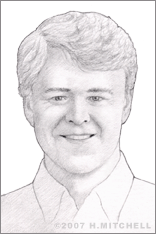Lee Lynd
Biologist, inventor, and engineer Lee Rybeck Lynd has devoted his career to developing processes for improving the feasibility of using biofuels as a mainstream, alternate energy source.
Born in 1957 and raised in Poughkeepsie, New York, Lynd was inspired by his socially active parents to focus on a cause as an approach to study and to work. He attended alternative schools until age 13, when he made the decision to attend a mainstream high school. He entered Bates College in 1975, where he majored in biology.
While working on an organic farm one summer in 1977, Lynd was surprised to learn how much heat could be generated by a compost pile. At that time, he began thinking about ways to use compost as a heat source. This experience gradually led him to more sophisticated thinking about ways to use biology to generate energy.
His research has since focused on ways to efficiently produce biofuels such as ethanol, which is alcohol distilled from fermented, mashed grain. Rising oil prices in the 1970s brought ethanol into the spotlight briefly, but when prices fell again in subsequent decades, research and interest trailed off as well. U.S. dependence on foreign oil quickly rose to more than 60 percent. Ethanol production remained a relatively small business, with most of it being derived from corn in a relatively inefficient process requiring a significant amount of fossil fuel.
Lynd, meanwhile, maintained his excitement with the notion of biofuel production and became fully committed to pushing it forward. He realized as an undergraduate that ethanol could be produced using inexpensive, organic materials such as straw, grass, wheat, and wood with cellulose-consuming bacteria. Developing organisms that were ideal for cellulosic biomass production became a major focus of his work, as did the development of cleaner, more efficient production mechanisms.
Lynd completed his BS degree in 1979 and pursued graduate studies at the University of Wisconsin, Madison, where he finished his MS in bacteriology in 1981. From there, wishing to gain a better understanding of the processes that would be needed to make efficient biomass energy production a reality, he enrolled as a graduate student in engineering at Dartmouth College’s Thayer School of Engineering, finishing his MS there in 1984 and his PhD in 1987.
At Dartmouth, Lynd focused on solving what many of his professors told him was the most important obstacle to biomass energy production: distillation. He worked on this challenge, developing and patenting several processes that he saw as effectively solving the problem. Then he returned to work on improved microorganisms. He remained at Dartmouth, taking on the role of Assistant Professor of Engineering at the college’s Thayer School from 1987 to 1993. In 1990, he also became an Adjunct Professor of Biology. He concurrently held the titles of Associate Professor of Engineering and Adjunct Associate Professor of Biology from 1993 to 2003.
His pioneering work culminated in the identification of a process configuration known as consolidated bioprocessing, or CBP, an efficient, one-step fermentation process for turning cellulosic biomass into ethanol. Lynd co-founded a company, Mascoma Corp., in 2006 to drive this process forward. He and his team have raised more than $50 million in venture capital funding for the firm, which is based in Lebanon, N.H. The company, for which Lynd served as Chief Scientific Officer, aims to advance CBP to make fuel production from cellulosic biomass a commercial reality.
Lynd is the Paul E. and Joan H. Distinguished Professor in Environmental Engineering Design and an Adjunct Professor of Biological Sciences at Dartmouth. He is also Professor Extraordinary of Microbiology at the University of Stellenbosch in South Africa. He is named on over a dozen patents, has testified before Congress, and advised the Executive Office of President Clinton on reducing greenhouse gas emissions from personal vehicles. He also collaborated on the report "Growing Energy: How Biofuels Can Help End America's Oil Dependence," published in 2004 by the National Resources Defense Council. Since 1998, he served as the volunteer manager of the Link Foundation Energy Fellowship program, the only fellowship available to support graduate work in the energy field in North America.
He was the 1990 recipient of the National Science Foundation’s Presidential Young Investigator Award and a two-time recipient of the Charles A. Lindbergh Award (1991 and 1994) for his efforts to promote balance between technological progress and the preservation of the natural and human environments. In 2007, Lynd received the inaugural $100,000 Lemelson-MIT Award for Sustainability, which recognizes inventors whose products and processes enhance economic opportunity and community well-being, while protecting and restoring the natural environment.


